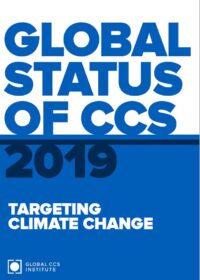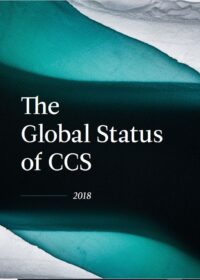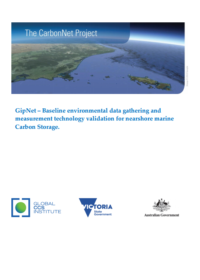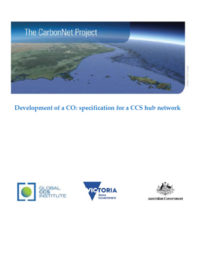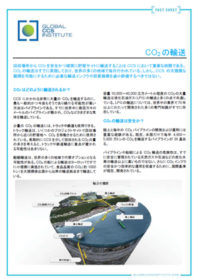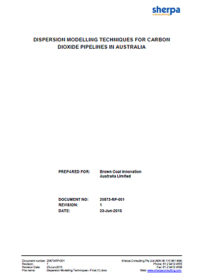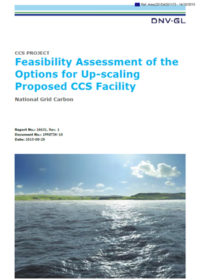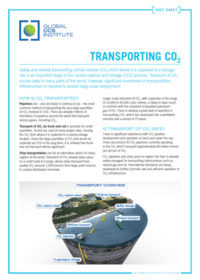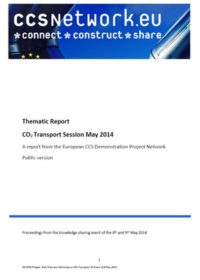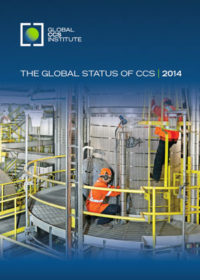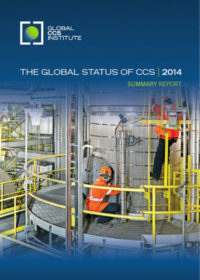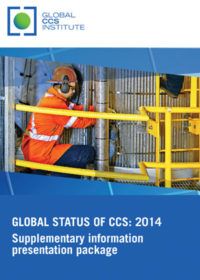Resources
Publications
Our publications, reports and research library hosts over 500 specialist reports and research papers on all topics associated with CCS.
View our Publication Library Disclaimer.
Filter by
Global Status of CCS Report: 2019
9th December 2019
Topic(s): Carbon capture and storage (CCS), CO2 hubs, CO2 storage, CO2 transport, Policy law and regulation
The 2019 Global Status of CCS report documents important milestones for CCS over the past 12 months, its status across the world and the key opportunities and benefits the technology presents.
The report provides detailed information on, and analyses of, the global CCS facility pipeline, policy, CO2 storage and the legal and regulatory environment. In addition, four regional updates and a CCS Technology section further demonstrate global development and the versatility of CCS across a variety of applications and industry sectors.
Disclaimer
The content within the Global CCS Institute Publications, Reports and Research Library is provided for information purposes only. We make every effort and take reasonable care to keep the content of this section up-to-date and error-free. However, we make no claim as to its accuracy, currency or reliability.
Content and material featured within this section of our website includes reports and research published by third parties. The content and material may include opinions and recommendations of third parties that do not reflect those held by the Global CCS Institute.
Global Status of CCS Report: 2018
10th December 2018
Organisation(s): Global CCS Institute
Topic(s): Carbon capture and storage (CCS), CCS policy, CO2 hubs, CO2 storage, CO2 transport
The Global Status of CCS Report 2018 documents the status of CCS around the world and significant operational milestones over the past 12 months. It demystifies common misunderstandings about the technology and identifies where and how it can, and must, be more widely deployed. It also tracks the worldwide progress of CCS technologies and the key opportunities and challenges CCS faces.
Disclaimer
The content within the Global CCS Institute Publications, Reports and Research Library is provided for information purposes only. We make every effort and take reasonable care to keep the content of this section up-to-date and error-free. However, we make no claim as to its accuracy, currency or reliability.
Content and material featured within this section of our website includes reports and research published by third parties. The content and material may include opinions and recommendations of third parties that do not reflect those held by the Global CCS Institute.
GipNet – Baseline environmental data gathering and measurement technology validation for nearshore marine Carbon Storage
22nd August 2016
Topic(s): CO2 storage, CO2 transport
Disclaimer
The content within the Global CCS Institute Publications, Reports and Research Library is provided for information purposes only. We make every effort and take reasonable care to keep the content of this section up-to-date and error-free. However, we make no claim as to its accuracy, currency or reliability.
Content and material featured within this section of our website includes reports and research published by third parties. The content and material may include opinions and recommendations of third parties that do not reflect those held by the Global CCS Institute.
The CarbonNet Project: development of a CO2 specification for a CCS hub network
25th May 2016
Topic(s): Carbon capture use and storage (CCUS), CO2 hubs, CO2 transport
The Global CCS Institute is supporting the development of the CarbonNet Project through a series of reports and enable the sharing of knowledge throughout its development. The CarbonNet Project, located in the Victoria, Australia is in its feasibility phase. It is planning the development of a hub-based network that will centre on a large capacity pipeline (up to 5 million tonnes per annum) to deep, secure storage sites in the offshore Gippsland Basin.
A critical aspect of hub-based network projects in general is the complex process of gathering multiple sources of CO2 (e.g. coal-fired power stations, natural gas processing, etc.), each with unique properties, into a single pipeline and into a storage site. This report explores the details of different specifications from the various potential capture methods and feedstock, which could come together and how that could impact the specifications of infrastructure and the storage site itself.
The report outlines the lower and upper bounds of the potential CO2 specifications a hub project could encounter and proposes technically achievable limitations on the whole of project chain. This includes source proponents’ requirement, pipeline integrity and composition, requirements of the storage site, as well as health, safety and environment factors. Finally, the report outlines the techno-economic trade-off between additional processing for the CO2 sources and the impact on transport and storage.
By undertaking these studies in the early phase of project development, barriers such as restrictive specifications can be minimised and this could reduce costs overall, whilst increasing the viability of the multi-user system- the key platform for any hub-based network project.
This report is a product of work undertaken by Parsons Brinckerhoff with inputs from the CarbonNet Project team.
Disclaimer
The content within the Global CCS Institute Publications, Reports and Research Library is provided for information purposes only. We make every effort and take reasonable care to keep the content of this section up-to-date and error-free. However, we make no claim as to its accuracy, currency or reliability.
Content and material featured within this section of our website includes reports and research published by third parties. The content and material may include opinions and recommendations of third parties that do not reflect those held by the Global CCS Institute.
インスティテュートは、CCSに関する基本情報をまとめたFACT SHEETシリーズを作成した。「CO2の輸送」は、CO2の輸送に焦点を当て概要をとりまとめたものである。
Japanese translation of Transporting CO2.
Disclaimer
The content within the Global CCS Institute Publications, Reports and Research Library is provided for information purposes only. We make every effort and take reasonable care to keep the content of this section up-to-date and error-free. However, we make no claim as to its accuracy, currency or reliability.
Content and material featured within this section of our website includes reports and research published by third parties. The content and material may include opinions and recommendations of third parties that do not reflect those held by the Global CCS Institute.
Dispersion modelling techniques for carbon dioxide pipelines in Australia
23rd September 2015
Topic(s): Carbon capture use and storage (CCUS), CO2 transport
The Global CCS Institute presents the first detailed report on CO2 pipeline design for Australia. This comprehensive investigation provides a critical review of current Australian and global pipeline design standards for CO2 transport. The report provides insight into the current Australian Standards for Pipeline Design, AS2885 and undertaking fit-for-purpose dispersion modeling for CO2 detailing a set of guidelines and best practice recommendations.
The report was prepared for Brown Coal Innovation by Sherpa Consulting and funded by the Australian National Low Emissions Coal Research and Development Ltd (ANLEC R&D) and the Department of Economic Development, Jobs, Transport, and Resources of the State of Victoria, administered through Brown Coal Innovation Australia Limited and is part of the series of reports focussing on CCS in Victoria.
Chris Consoli, Institute Senior Adviser for Storage, Asia-Pacific also provides an overview of the report in an Insight available on the Global CCS Institute website.
This report is republished with the permission of The CarbonNet Project. It was funded in part by a contribution by the Global CCS Institute, commissioned within the scope of The CarbonNet Project and in line with The Institute's mission to accelerate the development, demonstration and deployment of carbon capture and storage globally. The views expressed within the report are those of the authors and not necessarily of the Global CCS Institute.
Disclaimer
The content within the Global CCS Institute Publications, Reports and Research Library is provided for information purposes only. We make every effort and take reasonable care to keep the content of this section up-to-date and error-free. However, we make no claim as to its accuracy, currency or reliability.
Content and material featured within this section of our website includes reports and research published by third parties. The content and material may include opinions and recommendations of third parties that do not reflect those held by the Global CCS Institute.
Feasibility assessment of the options for up-scaling proposed CCS facility
28th August 2015
Topic(s): Carbon capture use and storage (CCUS), CO2 transport
National Grid Carbon (NGC) is developing a carbon dioxide transportation and storage system to support the provision of Carbon Capture and Storage technology in the Yorkshire and Humber region.
Initially, this will involve the construction of a cross country pipeline and subsea pipeline for transporting captured CO2 to a permanent storage site in the Bunter sandstone aquifer located within Block 5/42 of the UK sector of the Southern North Sea.
The initial CO2 load is anticipated to be supplied by the Drax power station and will be a maximum of 2.68 Million Tonnes per Annum (MTPA). However, with this load, the utilisation of the proposed CCS facility will be well below its capacity. NGC anticipates a second CO2 load from the Don Valley Power project to enhance the aquifer utilisation. In addition, NGC is also seeking to review potential options for up-scaling the CCS facility by transporting additional CO2 from Rotterdam via ship or pipeline into the proposed injection facility.
DNV GL have been engaged by NGC to carry out a feasibility study to assess two options for up-scaling the proposed carbon capture and storage facilities. Option 1 proposes to transport CO2 from Rotterdam directly to the injection facility in the Southern North Sea (Pipeline Option) whilst Option 2 proposes to transport CO2 by ship from Rotterdam to a reception facility on the River Humber, from where a pipeline will connect into the proposed CCS Cross Country pipeline at Camblesforth multi-junction (Shipping Option).
Three flow rates have been assessed for each option; (A) 2 MTPA, (B) 5 MTPA, and (C) 7.32 MTPA.
The findings and recommendations from this study are presented in this report.
Disclaimer
The content within the Global CCS Institute Publications, Reports and Research Library is provided for information purposes only. We make every effort and take reasonable care to keep the content of this section up-to-date and error-free. However, we make no claim as to its accuracy, currency or reliability.
Content and material featured within this section of our website includes reports and research published by third parties. The content and material may include opinions and recommendations of third parties that do not reflect those held by the Global CCS Institute.
This fact sheet by the Global CCS Institute describes how carbon dioxide is safely transported during the carbon capture and storage process.
Disclaimer
The content within the Global CCS Institute Publications, Reports and Research Library is provided for information purposes only. We make every effort and take reasonable care to keep the content of this section up-to-date and error-free. However, we make no claim as to its accuracy, currency or reliability.
Content and material featured within this section of our website includes reports and research published by third parties. The content and material may include opinions and recommendations of third parties that do not reflect those held by the Global CCS Institute.
Thematic report: CO2 transport session May 2014
9th December 2014
Topic(s): Carbon capture use and storage (CCUS), CO2 transport
This report summarises the topics discussed at the Thematic Workshop on CO2 Transport of the European CCS Demonstration Project Network. It covers the updates from three Network projects: ROAD (NL), Compostilla (ES), and Sleipner (NO) with apologies for absence from the Don Valley Project (UK).
The knowledge sharing meeting, held in Ponferrada (Spain) on 8-9 May 2014 and hosted by CIUDEN (Compostilla Project), addressed also the topics of storage and regulatory developments, covered in separate reports.
Disclaimer
The content within the Global CCS Institute Publications, Reports and Research Library is provided for information purposes only. We make every effort and take reasonable care to keep the content of this section up-to-date and error-free. However, we make no claim as to its accuracy, currency or reliability.
Content and material featured within this section of our website includes reports and research published by third parties. The content and material may include opinions and recommendations of third parties that do not reflect those held by the Global CCS Institute.
The Global Status of CCS: 2014
5th November 2014
Topic(s): Carbon capture use and storage (CCUS), CO2 capture, CO2 storage, CO2 transport, CO2 utilisation
The Global CCS Institute is pleased to announce the release of our Global Status of CCS: 2014 report.
The report provides a detailed overview of the current status of large-scale CCS projects worldwide, finding that 2014 has been a pivotal year for CCS, which is now a reality in the power industry.
For the first time, the report introduces and provides links to project descriptions for around 40 lesser scale ‘notable’ CCS projects. The 2014 report focuses on a number of ‘notable’ projects in Japan.
The Global Status of CCS: 2014 report provides a comprehensive overview of global and regional developments in CCS and what is required to support global climate mitigation efforts. Providing a number of key recommendations for decision makers, The Global Status of CCS: 2014 report is an important reference guide for industry, government, research bodies and the broader community.
Supplementary Information Presentation Package
Disclaimer
The content within the Global CCS Institute Publications, Reports and Research Library is provided for information purposes only. We make every effort and take reasonable care to keep the content of this section up-to-date and error-free. However, we make no claim as to its accuracy, currency or reliability.
Content and material featured within this section of our website includes reports and research published by third parties. The content and material may include opinions and recommendations of third parties that do not reflect those held by the Global CCS Institute.
The Global Status of CCS: 2014 Summary Report
5th November 2014
Topic(s): Carbon capture use and storage (CCUS), CO2 capture, CO2 storage, CO2 transport, CO2 utilisation
The Global Status of CCS: 2014 Summary Report provides an executive overview of the key findings and recommendations contained in the Institute’s Global Status of CCS: 2014 report.
Disclaimer
The content within the Global CCS Institute Publications, Reports and Research Library is provided for information purposes only. We make every effort and take reasonable care to keep the content of this section up-to-date and error-free. However, we make no claim as to its accuracy, currency or reliability.
Content and material featured within this section of our website includes reports and research published by third parties. The content and material may include opinions and recommendations of third parties that do not reflect those held by the Global CCS Institute.
The Global Status of CCS: 2014 Supplementary Information Presentation Package
5th November 2014
Topic(s): Carbon capture use and storage (CCUS), CO2 capture, CO2 storage, CO2 transport, CO2 utilisation
The Supplementary Information presentation package includes chart materials not included in the Global Status of CCS: 2014 report. This material provides additional detail on the status of large-scale CCS projects globally. When used in conjunction with previous status reports, it provides researchers with access to the world’s most comprehensive historical data set on large-scale CCS projects.
Disclaimer
The content within the Global CCS Institute Publications, Reports and Research Library is provided for information purposes only. We make every effort and take reasonable care to keep the content of this section up-to-date and error-free. However, we make no claim as to its accuracy, currency or reliability.
Content and material featured within this section of our website includes reports and research published by third parties. The content and material may include opinions and recommendations of third parties that do not reflect those held by the Global CCS Institute.
